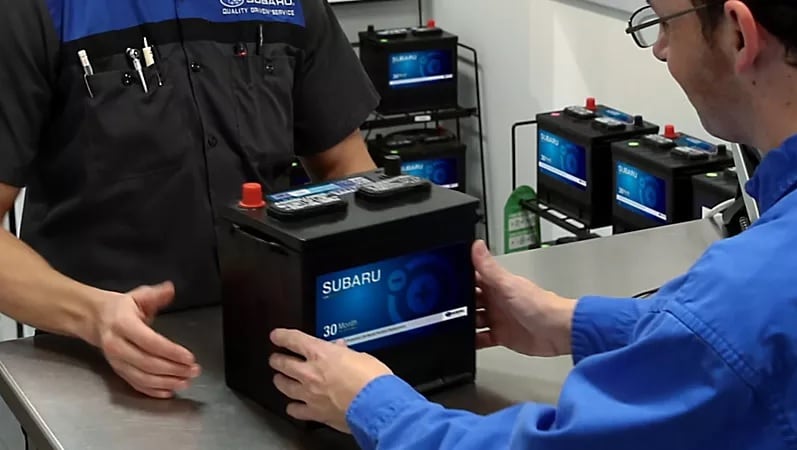

Did you know that your Subaru battery typically lasts around four years? It is a crucial component often neglected until it stops working, leaving you in inconvenient situations. However, you don't need to worry, as proper care can help extend its life and keep you on the road without any trouble. Your local Subaru dealer can keep track of your battery's health and make sure it is functioning optimally. Also, when it's time for a replacement, you should choose a Genuine Subaru Battery. It is designed to fit and power your specific model. It has an impressive 30-month free replacement warranty, including labor and free towing to the nearest Subaru retailer if required within that period due to a covered battery defect.
Despite being labeled "maintenance-free," Subaru batteries still require attention to maintain peak performance. It is a common misconception that these batteries can be ignored entirely. They benefit from occasional checks to ensure they remain clean and efficient. This article will discuss essential battery care tips tailored to your Subaru. From basic maintenance routines to proactive measures, it will give you the knowledge you need to safeguard your battery's longevity and reliability. Whether you are an experienced driver or new to Subaru ownership, these insights will be invaluable in ensuring your vehicle remains powered up and ready to tackle anything the road throws your way.
Regular Inspection
Regular inspection is the cornerstone of effective battery care for your Subaru. Just as you wouldn't ignore a leak in your roof, it's essential to watch for any signs of trouble with your battery. Make it a habit to give your battery a visual once-over every few months, checking for corrosion around the terminals, leaks, or any physical damage. Even small issues can snowball into major headaches if left unattended.
Corrosion around the battery terminals is a common issue that can hinder the flow of electricity and lead to starting problems. Fortunately, it's relatively easy to spot and address. If you notice any white or greenish powdery substance buildup on the terminals, it's time for some cleaning. Use a mixture of baking soda and water along with a wire brush to gently scrub away the corrosion. Taking care of this simple task can go a long way in ensuring your battery operates smoothly and reliably.
Additionally, never ignore leaks or physical damage to the battery casing. These issues can not only impact the battery's performance but also pose safety risks. If you detect any leaks or visible damage, it's crucial to promptly address and bring them to your Subaru dealership. Ignoring these warning signs could result in a compromised battery, leaving you stranded when you least expect it.
Secure Hold-Down
It's important to keep your car battery securely held down to prevent vibrations that could damage the internal components and lead to premature failure. Think of it as a cozy seatbelt for your battery, ensuring it stays snug and secure even during bumpy rides.
A hold-down mechanism, which is typically a bracket or clamp, plays a vital role in keeping the battery in place. However, these components can become loose or corroded over time, compromising their effectiveness. Therefore, it's important to periodically check the hold-down mechanism and ensure it's properly tightened and in good condition.
Avoid Deep Discharges
One of the most vital yet often overlooked aspects of battery care for your Subaru is avoiding deep discharges. You might wonder, "how long should a car battery last?" Well, that largely depends on how well you treat it. Deep discharges occur when the battery's charge level falls below a certain threshold. This often happens when you use accessories such as lights, radios, or charging ports while the engine is off, draining the battery beyond its intended capacity. It is essential to remember that freely using accessories without considering your battery's health can lead to costly replacements sooner than expected.
Keep It Charged
You might be wondering, "How to tell if a car battery is dead?" Well, it's usually too late by the time you notice your car won't start. To avoid this situation, it's best to use a battery maintainer or trickle charger if you're not going to use your Subaru for an extended period. These devices help keep your battery healthy and prevent the drain caused by modern vehicles' electronics even when parked.
Leaving your Subaru idle for weeks or months can lead to a discharged battery, leaving you stranded when you're ready to hit the road again. To avoid any inconvenience, using a car battery tester before hitting the road is recommended. It's a small investment that can save you the frustration of dealing with a dead battery.
Avoid Extreme Temperatures
Like humans, batteries also suffer in extreme cold or heat. In cold weather, the battery's chemical reactions slow down, making it difficult for it to deliver power to start your car. On the other hand, scorching heat can speed up internal corrosion and reduce the battery's lifespan. You can help maintain your Subaru's battery health and ensure reliable starts in any weather by parking in shaded areas or using a battery insulation kit during extreme temperatures.
Check Electrical System
If your car struggles to start but battery is fine, there could be several potential causes. While the battery may appear to be in good condition, it may not be delivering enough power to start the engine reliably. However, the issue may not always be with the battery itself. Often, underlying problems within the electrical system can put undue strain on the battery, resulting in starting difficulties. Therefore, it's important to regularly inspect your Subaru's electrical system for any signs of trouble.
Watch out for possible warning signs like dimming headlights, flickering dashboard lights, or unusual noises when starting the engine. These could indicate issues with the alternator responsible for charging the battery while the engine is running. A faulty alternator can fail to replenish the battery's charge, leaving it depleted and unable to start the car reliably. In addition, faulty electrical components or wiring problems can draw excessive power, draining the battery even when the car is parked.
Replace When Necessary
If you have ever noticed the battery light on car dashboard glowing or experienced difficulty in starting your vehicle, it might be a sign that you already need to change your battery. Knowing the signs your car battery is dying can save you from being stranded at the most inconvenient times. Generally, Subaru car batteries last around 4-5 years, but factors like usage and environmental conditions can impact their lifespan. If your battery is nearing its end or showing signs of deterioration, it's wise to replace it proactively rather than waiting for it to fail unexpectedly.
Follow Manufacturer Recommendations
When caring for your Subaru's battery, one of the most reliable sources of guidance is right at your fingertips: your owner's manual. This valuable resource provides specific battery care guidelines and recommendations straight from the manufacturer. While general battery care tips can be helpful, your Subaru's unique specifications and requirements are best addressed by consulting the manual. From recommended maintenance schedules to tips for preserving battery longevity, the owner's manual is your go-to reference for ensuring your Subaru's battery remains in top-notch condition.
Wrap-Up
Taking proper care of your Subaru's battery is crucial to ensure reliability and avoid any unexpected trouble. It's important to follow these eight essential battery care tips to prolong the life of your vehicle's battery and prevent any inconvenient failures. Remember to refer to your Subaru's owner's manual for specific guidelines and recommendations from the manufacturer, as each vehicle may have unique requirements. Proactive maintenance is key to keeping your Subaru running smoothly, whether it's through regular inspections, avoiding deep discharges, or keeping your battery fully charged. By giving your battery the care and attention it needs, you can enjoy worry-free driving and peace of mind knowing your Subaru's battery is in good condition.





